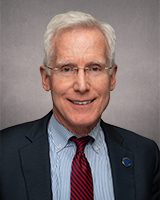GSA Journals Lead Among Most-Cited Publications
By CEO James Appleby, BSPharm, MPH

The latest journal impact factors are in, and I’m proud to say that GSA’s journals have reached all-time highs. This is a testament to the hard work and scholarship that the GSA community has produced, from authors to reviewers to editors. Peer-reviewed journals are how fields of inquiry have conversations among themselves, and impact factor is a leading metric we look to gauge success.
Impact factor is a measure of the frequency with which articles in a journal from the two preceding years have been cited in the given year. The Web of Science Group, part of Clarivate Analytics, has released the 2021 update to its annual Journal Citation Report, which includes impact factor rankings for 2020. It shows that GSA’s journals took three of the top five spots in the Social Sciences Citation Index’s Gerontology category with their highest impact factors on record.
Here’s how GSA’s journals are thriving:
- The Journals of Gerontology, Series A: Biological Sciences and Medical Sciences — led by Editors-in-Chief Rozalyn Anderson, PhD, FGSA, David LeCouteur, MBBS, FRACP, PhD, and Lewis Lipsitz, MD, FGSA — remains number one on the list for the 11th consecutive year, with an impact factor of 6.053.
- The Gerontologist — led by Editor-in-Chief Suzanne Meeks, PhD, FGSA — ranked third with an impact factor of 5.271.
- And The Journals of Gerontology, Series B: Psychological Sciences and Social Sciences — led by Editors-in-Chief Derek Isaacowitz, PhD, FGSA, and Jessica Kelley, PhD, FGSA — ranks fifth with an impact factor of 4.077.
To mark the continued growth of these prestigious publications, GSA’s publisher, Oxford University Press, has curated a selection of high impact articles from recent years across our journals and made them free to read online.